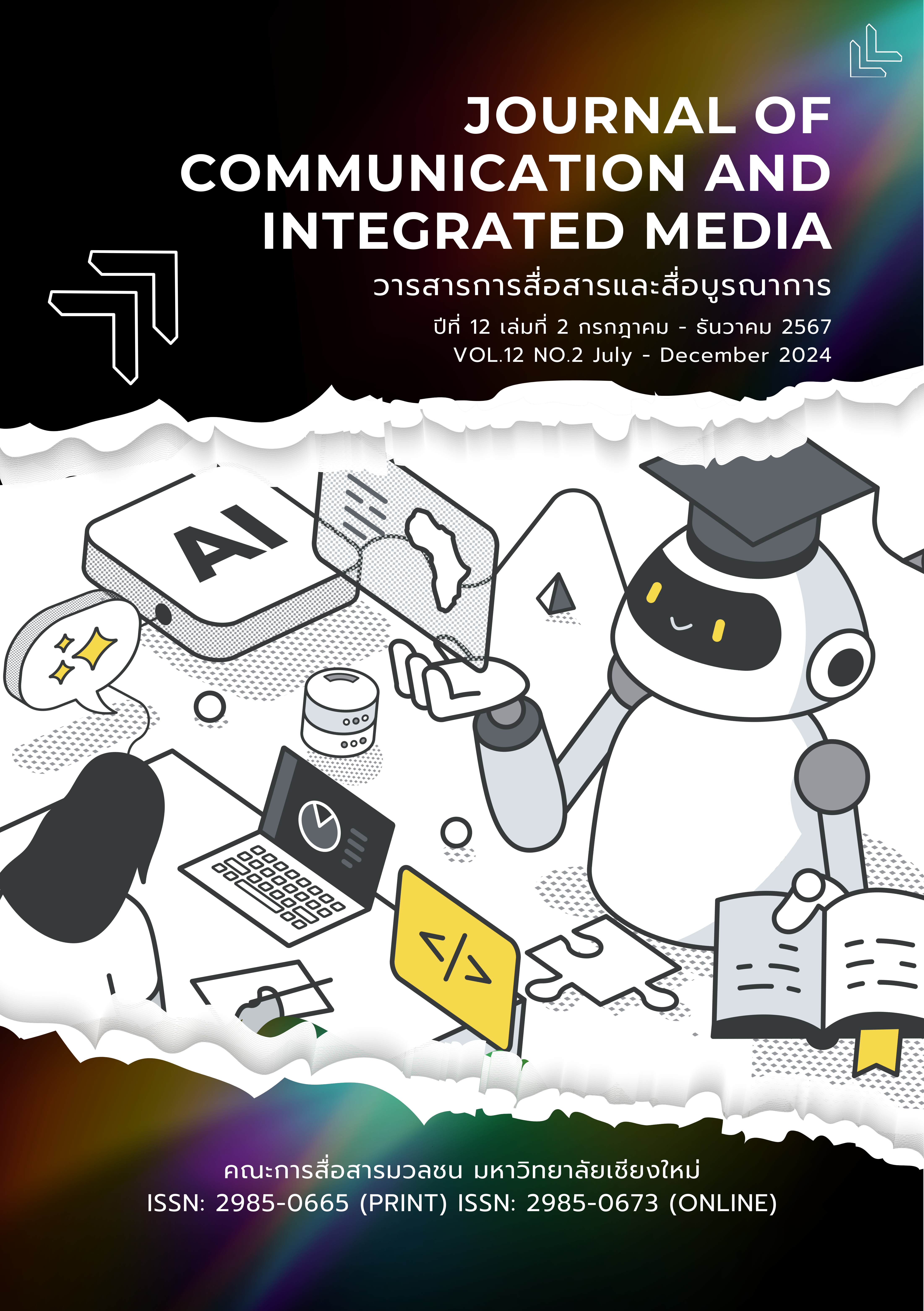การสังเคราะห์สมรรถนะการรู้เท่าทันนวัตกรรมสื่อดิจิทัลร่วมกับเทคโนโลยีปัญญาประดิษฐ์
Main Article Content
บทคัดย่อ
บทความวิชาการเรื่อง การสังเคราะห์สมรรถนะการรู้เท่าทันนวัตกรรมสื่อดิจิทัลร่วมกับเทคโนโลยีปัญญาประดิษฐ์ เป็นการสังเคราะห์ทฤษฎีที่เกี่ยวข้องกับการรู้เท่าทันสื่อดิจิทัล และทฤษฎีที่เกี่ยวข้องกับการรู้เท่าทันเทคโนโลยีปัญญาประดิษฐ์ เพื่อสร้างแนวคิดที่เกี่ยวข้องกับการส่งเสริมและพัฒนาการรู้เท่าทันนวัตกรรมสื่อดิจิทัลร่วมกับเทคโนโลยีปัญญาประดิษฐ์ ทั้ง 4 ด้านประกอบด้วย 1) การเข้าถึงอย่างมีความรู้ 2) การเข้าใจในการประยุกต์ใช้งาน 3) การสร้างและการประเมิน และ 4) การมีปฏิสัมพันธ์อย่างมีจริยธรรม นอกจากนี้ผู้เขียนได้ศึกษาทฤษฎีเกี่ยวกับนวัตกรรมสื่อ และทฤษฎีเกี่ยวกับเทคโนโลยีปัญญาประดิษฐ์ โดยกำหนดวิธีการและระบบการเรียนรู้ เพื่อส่งเสริมการรู้เท่าทันนวัตกรรมสื่อดิจิทัลร่วมกับเทคโนโลยีปัญญาประดิษฐ์ และบูรณาการทฤษฎีเชิงระบบ ประกอบด้วย 1) ปัจจัยนำเข้า 2) กระบวนการ 3) ผลลัพธ์การเรียนรู้ 4) ผลลัพธ์และคุณค่า และ 5) ผลกระทบของการเรียนรู้ เพื่อเป็นแนวทางในการพัฒนาระบบการเรียนการสอนในยุคดิจิทัล
Article Details

อนุญาตภายใต้เงื่อนไข Creative Commons Attribution-NonCommercial-NoDerivatives 4.0 International License.
ลิขสิทธ์ที่ผู้เขียนบทความต้องยอมรับ
เอกสารอ้างอิง
กองทุนพัฒนาสื่อปลอดภัยและสร้างสรรค์. (2564). การสร้างนวัตกรรมเพื่อการพัฒนาสื่อปลอดภัยและสร้างสรรค์. https://www.thaimediafund.or.th/wp-content/uploads/2021/04/การสร้างนวัตกรรมเพื่อการพัฒนาสื่อปลอดภัยและสร้างสรรค์.pdf
เก่ง จันทร์นวล. (2562). การรู้เท่าทันสื่อดิจิทัล Digital Literacy .[เอกสารที่ไม่ได้ตีพิมพ์]. มหาวิทยาลัยราชภัฏบุรีรัมย์.
กุลเชษฐ์ เล็กประยูร. (2567). การสร้างสื่อการสอนด้วยนวัตกรรมสุดล้ำ AI เพื่อการเรียนรู้ในยุคดิจิทัล. [Poster presentation]. มหาวิทยาลัยกรุงเทพ. กรุงเทพฯ ประเทศไทย.
ฐานเศรษฐกิจดิจิทัล. (2564, 2 พฤศจิกายน). “นิเทศศาสตร์ปัญญาประดิษฐ์” DATA+AI นวัตกรรมสื่อสารปี 2022. https://www.thansettakij.com/general-news/501907
เนิร์ดออฟติไมซ์. (2566, 26 มิถุนายน). Generative AI คืออะไร มีกี่ประเภท โดดเด่นแค่ไหน ใช้ทำอะไรได้บ้าง. https://nerdoptimize.com/generative-ai
พนม คลี่ฉายา. (2559). การรู้เท่าทันสื่อดิจิทัลของนักเรียนมัธยม. วารสารนิเทศศาสตรปริทัศน์, 20(1), 46-57.
พนม คลี่ฉายา. (2565). กระบวนทัศน์ความรอบรู้เรื่องสื่อ พัฒนาการ และปฏิบัติการจากสื่อดั้งเดิมสู่ดิจิทัล. สำนักพิมพ์โครงการตําราและเอกสารวิชาการ คณะนิเทศศาสตร์ จุฬาลงกรณ์มหาวิทยาลัย.
พิมพ์ตะวัน จันทัน. (2566). การศึกษาทักษะการรู้เท่าทันสื่อดิจิทัล (Digital Literacy) ของนิสิตครูสังคมศึกษา เพื่อการปรับตัวในโลกยุคผันผวน (VUCA World). วารสารสังคมศาสตร์และวัฒนธรรม, 7(12), 24-34.
วศิน เพิ่มทรัพย์ และ โชค วิศวโยธิน. (2566). ChatGPT AI ปฏิวัติโลก. สำนักพิมพ์โปรวิชั่น.
แววตา เตชาทวีวรรณ และ อัจศรา ประเสริฐสิน. (2559). การประเมินการรู้ดิจิทัลของนักศึกษาระดับปริญญาตรีในเขต กรุงเทพมหานครและปริมณฑล. วารสารสารสนเทศศาสตร์, 34(4), 1-28.
สำนักงานนวัตกรรมแห่งชาติ. (ม.ป.ป.). นวัตกรรมสื่อ (Media Innovation). https://www.nia.or.th/frontend/bookshelf/lGkxtfkhBc1AH/62d3e28f5548b.pdf
สำนักงานพัฒนาธุรกรรมทางอิเล็กทรอนิกส์. (2564, 22 พฤษภาคม). AI in Government Services ปัญญาประดิษฐ์ในการบริการภาครัฐ. https://www.etda.or.th/getattachment/bb938d1a-6dd4-4407-bd87-d026773eda89/AI-in-Government-Services.aspx
สำนักงานราชบัณฑิตยสภา. (2562, 14 สิงหาคม). artificial intelligence (AI)ปัญญาประดิษฐ์ (เอไอ). Facebook. https://www.facebook.com/RatchabanditThai/photos/a.2519695738088506/2527567403968006/
สำนักงานส่งเสริมเศรษฐกิจดิจิทัล. (ม.ป.ป.). เทคโนโลยีที่สำคัญในยุคดิจิทัล: เทคโนโลยีปัญญาประดิษฐ์ Tech Series: Artificial Intelligence (AI). https://www.depa.or.th/th/article-view/tech-series-artificial-intelligence-ai
สุทธิชัย ทักษนันต์. (2563). AI เปลี่ยนอนาคตโลก (AI CHANGE THE FUTURE WORLD). สำนักพิมพ์บ้านพระอาทิตย์.
สุภารักษ์ จูตระกูล. (2559). ครอบครัวกับการรู้เท่าทันสื่อดิจิทัล (Digital Literacy) ของดิจิทัลเนทีฟ (Digital Natives). วารสารวิทยาการจัดการ มหาวิทยาลัยราชภัฏเชียงราย, 11(1), 99-118.
โอบนิธิ นพภา. (ม.ป.ป.). การพัฒนาแบบก้าวกระโดดของปัญญาประดิษฐ์ส่งผลกระทบต่อแรงงานอย่างไร. สำนักงานส่งเสริมเศรษฐกิจดิจิทัล. DEPA. https://www.depa.or.th/en/article-view/ai-development-labor-impact
Celik, I. (2023). Exploring the determinants of artificial intelligence (AI) literacy: Digital divide, Computational thinking, Cognitive absorption. Telematics and Informatics, 83, 1-11. https://doi.org/10.1016/j.tele.2023.102026
Crabtree, M. (2023, August 8). What is AI literacy? A Comprehensive guide for beginners. Datacamp. https://www.datacamp.com/blog/what-is-ai-literacy-a-comprehensive-guide-for-beginners
Laupichler, M., Aster, A., Haverkamp, N., & Raupach, T. (2023). Development of the “Scale for the assessment of non-experts’ AI literacy” – An exploratory factor analysis. Computers in Human Behavior Reports, 12, 1-10. https://doi.org/10.1016/j.chbr.2023.100338
Liang, Q., Torre, J. D. L., & Law, N. (2021). Do background characteristics matter in children's mastery of digital literacy? A cognitive diagnosis model analysis. Computers in Human Behavior, 122, 1-13. https://doi.org/10.1016/j.chb.2021.106850
McCartney, A. (2023, October 16). Gartner top 10 strategic technology trends for 2024. Gartner. https://www.gartner.com/en/articles/gartner-top-10-strategic-technology-trends-for-2024
Ng, D. T. K., Leung, J. K. L., Chu, S. K. W., & Qiao, M. S. (2021). Conceptualizing AI literacy: An exploratory review. Computers and Education: Artificial Intelligence, 2, 1-11. https://doi.org/10.1016/j.caeai.2021.100041
Putjorn, T., & Putjorn, P. (2023). Augmented Imagination: Exploring generative AI from the perspectives of young learners. [Paper presentation]. 15th International Conference on Information Technology and Electrical Engineering (ICITEE), Chiang Mai, Thailand. https://doi.org/10.1109ICITEE59582.2023.10317680
Senarak.tripod. (n.d.). วิธีระบบ System approach. https://senarak.tripod.com/system.htm#top
Storsul, T., & Krumsvik, A. H. (2013). Media innovations: A multidisciplinary study of change (n.p.). https://www.researchgate.net/publication/270510055_Media_Innovations_A_Multidisciplinary_Study_of_Change_2013
Su, J., Ng, D. T. K., & Chu, S. K. W. (2023). Artificial intelligence (AI) literacy in early childhood education: The challenges and opportunities. Computers and Education: Artificial Intelligence, 4, 1-14. https://doi.org/10.1016/j.caeai.2023.100124
Yao, M., Jia, M., & Zhou, M. (2018). Applied artificial intelligence. (n.p.).


